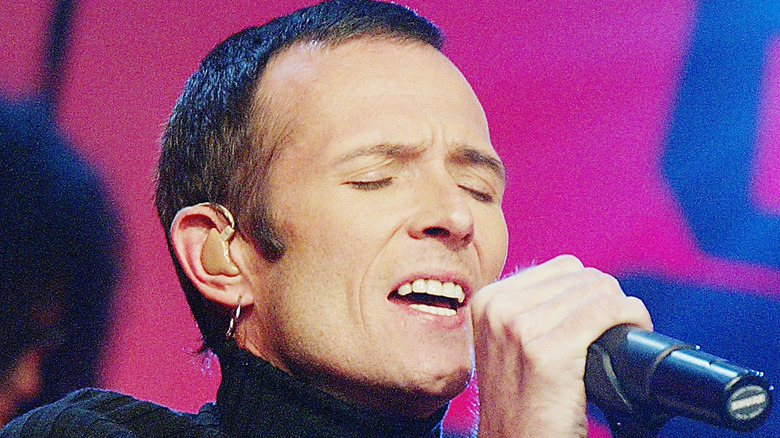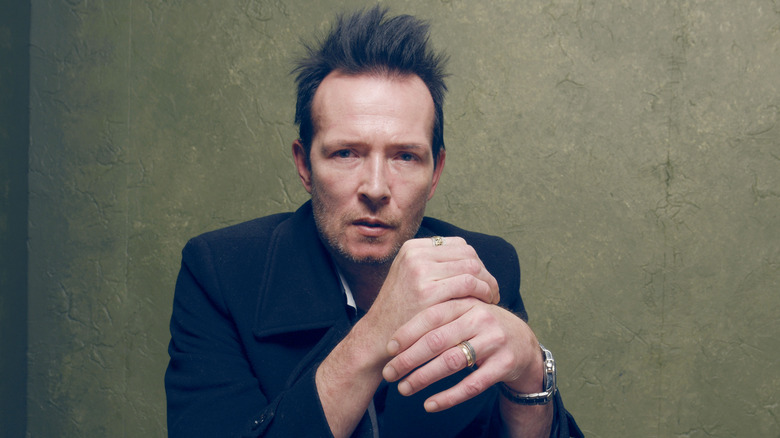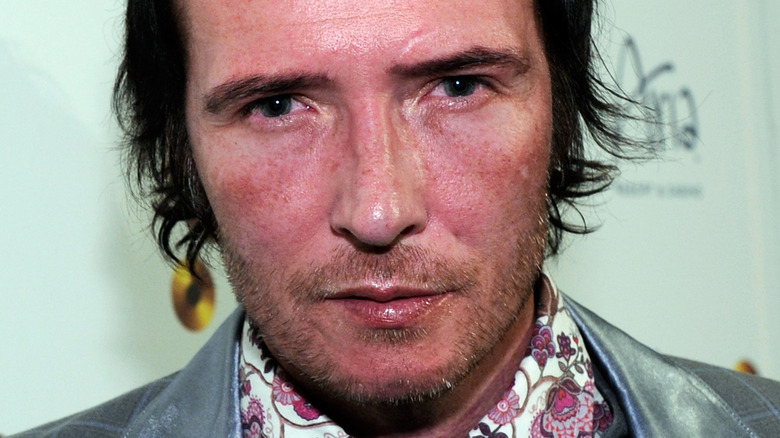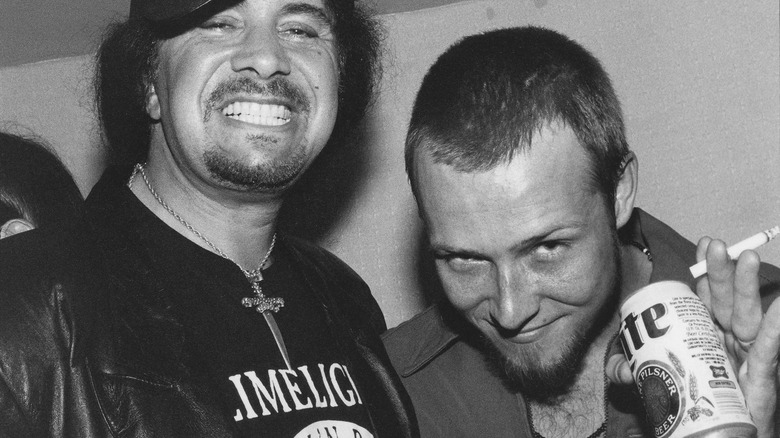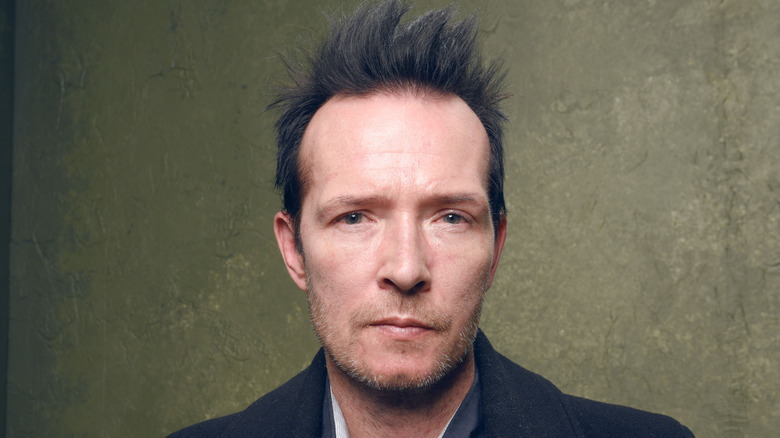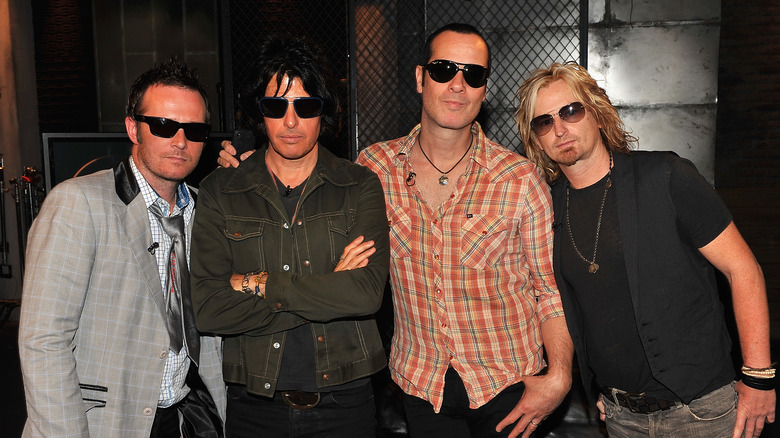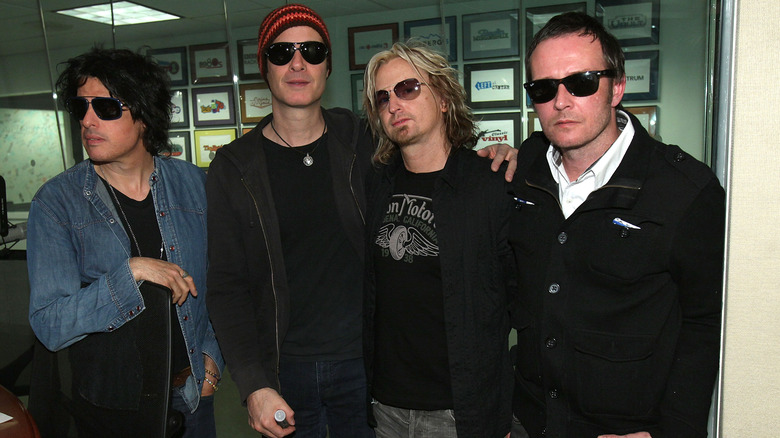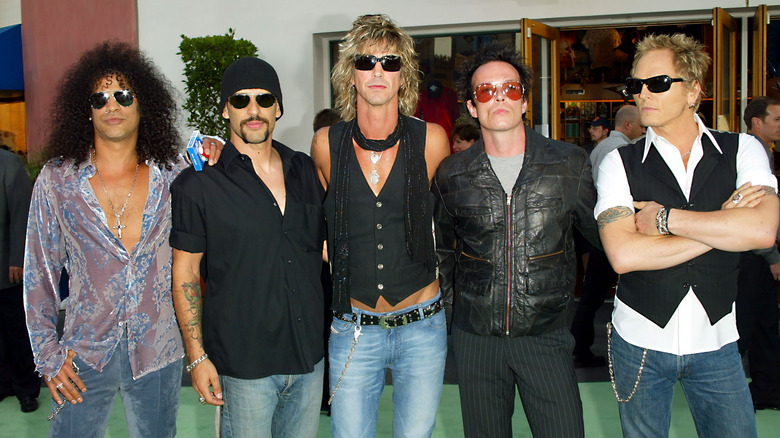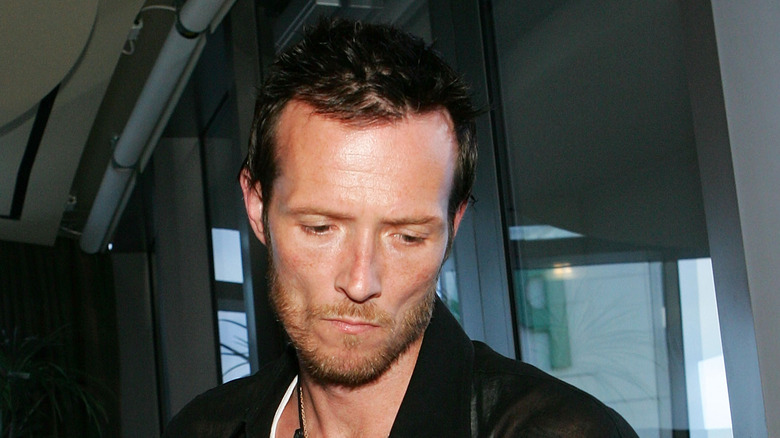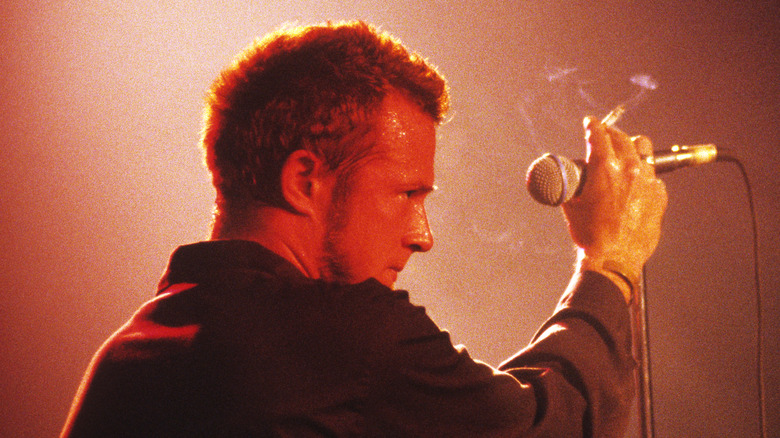Tragic Details About Stone Temple Pilots' Scott Weiland
Like many legendary rock stars, frontman Scott Weiland has lived a life of the highest highs and lowest lows. His first band, Stone Temple Pilots, was one of the biggest acts in grunge history, with several of their records throughout the '90s going multiplatinum, according to the Recording Industry Association of America. Thanks largely to Weiland's inimitable voice, smash hits like "Plush," "Vasoline," and "Interstate Love Song" remain some of the most instantly recognizable and iconic tunes of the '90s.
Then, in the early 2000s, he enjoyed another successful stint as the lead singer of Velvet Revolver — the rock supergroup featuring ex Guns N' Roses members Slash, Duff McKagan, and Matt Sorum. According to Loudwire, that group sold millions of their first album, "Contraband," in an age when both traditional album sales and rock music in general were on the way out.
And yet, every excess and success was more than balanced out by tragedies (largely of Weiland's own making). From a traumatic incident as a child to out of control drug abuse, constant legal headaches and stints in jail, and estrangement from both fed-up bandmates and, eventually, his lovers and children, these are tragic details of Scott Weiland.
Scott Weiland was sexually assaulted as a kid
Scott Weiland's story got off to a tragic start. He discussed in his book "Not Dead & Not for Sale," a particular incident that happened when the future Stone Temple Pilots and Velvet Revolver frontman was only 12, years before he started down the path of music and addiction that would come to define his life.
He recalled a "big muscular guy, a high school senior ... [who] rode the bus with me every day to school ... invited me to his house." There, Weiland says he was sexually assaulted in the other person's home and then threatened into silence. 'Tell anyone,' he quotes the assailant as saying, "'and you'll never have another friend in this school. I'll ruin your ... reputation.'"
Weiland went on to say that not only was he indeed too scared to tell anyone at the time, but that the memory was eventually repressed. It was only unearthed in therapy sessions much later in life during one of his many stints in rehab. "Therapy will do that to you," he said.
If you or anyone you know has been a victim of sexual assault, help is available. Visit the Rape, Abuse & Incest National Network website or contact RAINN's National Helpline at 1-800-656-HOPE (4673).
He struggled with mental illness
Louder says Scott Weiland was known for his rock star swagger and magnetic sex appeal long before becoming a successful singer. But it makes sure to point out that much of that was a form of well-honed cover for a multitude of insecurities and mental health issues. It goes on to say that he had struggled with bipolar disorder for years before finally getting diagnosed with it at the age of 34. By that time, although he started getting properly medicated for it, the drug habit he'd already partially built to deal with the condition was in full swing and had become a problem of its own.
Later in life, both the drugs and the mental illnesses would wreak havoc on his personal relationships, and he was powerless to stop it. Billboard interviewed Jamie Weiland, Scott's second wife and eventual widow, in 2016. What began as a passionate romance soon unraveled into a nightmare.
"He would be on the couch with a drink, smoking and watching whatever mindless television," she said. "I started to see he had paranoia and some of the bipolar stuff started to come out. At one point, it was so bad I had to move out because he was unstable."
In addition to the illicit drugs he was already on, Scott also struggled with his numerous prescriptions. Jamie says he constantly alternated between having good months on a healthy dose to gaining weight and acting out because the dosage was off.
He started experimenting with alcohol and drugs at a young age
In an article released shortly after Scott Weiland's tragic 2015 death, Louder retraces the singer's steps with substance abuse. As is far too often the case with rock stars and junkies, his drug habits began when he was young. He wouldn't try heroin until 1993, when STP had already been signed to Atlantic Records. But he still had an outrageous drug habit before that.
In a 2005 interview with Esquire, which begins by calling Weiland "Kurt Cobain without the shotgun" due to his drug problems, Weiland said he'd become a notorious hard partier and binge drinker while he was young.
"There were parties every weekend," he said. "My drinking kind of escalated. At the beginning of my freshman year, we'd get f***ed up on Friday and Saturday, and then we'd make it all the way till the next Friday before doing it again. But as time went on, it became a fixation. An obsession. All you could think about the whole week was getting to Friday again so you could party. That was all I ever thought about."
Before long, Weiland wasn't just drinking: He was doing blow. However, he says it wasn't that bad when it started, only doing about two lines here and there because the high lasted a while. "I think the devil gives you the first time for free," he said.
He got hooked on heroin
Louder says that becoming a rock star was one of the worst things that could've happened to Scott Weiland. Sure, it was the beginning of a celebrated career in music. But it also gave him all the resources he needed to pursue an already out of control drug habit. By that point, the article says Weiland had already moved from binge drinking to cocaine and weed. It wouldn't be long before he would shoot up for the first time.
The singer said, in 1998, "When I tried heroin for the first time it seemed to make all those insecurities just go away. I suddenly felt: 'Wow, this is how normal people feel on a day-to-day basis.'" Louder then notes that by 1994, Weiland as spending a mind-blowing $3,000 a week on the drug.
In an interview with Rolling Stone, Weiland said his smack habit was tied to his cocaine one. "It [cocaine] just makes you want more coke. That's why I always had to do heroin with coke." He went on to describe the how doing cocaine excessively would make him go a little crazy, so much so that he needed the heroin to calm back down and come down from the cocaine.
If you or anyone you know is struggling with addiction issues, help is available. Visit the Substance Abuse and Mental Health Services Administration website or contact SAMHSA's National Helpline at 1-800-662-HELP (4357).
He was frequently in trouble with the law
When you're constantly around drugs, trouble with the law isn't far behind. And Scott Weiland was no stranger to legal issues. MTV says that in 1998, the "Interstate Love Song" singer was picked up by the authorities for possession of roughly $100 worth of heroin, during a police raid of a New York housing development notorious for drug abuse. Rolling Stone says that although it was his first arrest, he had been to rehab plenty of times throughout the mid-'90s.
And it was only his first run-in with the cops. In May 2003, EW says he was arrested again for felony possession of a controlled substance (and a mere month before joining Velvet Revolver, according to AllMusic), just a few years after spending time in jail in 1999 for probation violation. In 2001, Weiland was arrested on a domestic violence charge (as per Billboard).
In 2008, Reuters reports Weiland was arrested for drunk driving (his second in roughly four years). As punishment, the article says he spent just over a week in jail, paid a $1,600 fine, and was placed back on probation. Months later, a fed-up Velvet Revolver, featuring multiple GN'R members trying to manage their own sobriety, would part ways with him.
Despite his troubled record, at no point was he ever punished severely enough to change his ways. Tragedy loomed on the horizon.
STP has often been critically dismissed
Between Metallica, Guns N' Roses, Pearl Jam, Nirvana, the Red Hot Chili Peppers, Alice in Chains, Soundgarden, and countless other rock legends, the early '90s were a good time to be a headbanger. Somewhere in the mix was Stone Temple Pilots, who released their debut album, "Core," in 1992, as per AllMusic. In 1994 they put out "Purple," with singles "Vasoline" and "Interstate Love Song." In 1996 came "Tiny Music," which AV Club says marked as a leap forward in ambitious creativity for the band. In fact, the whole article is about how good the Pilots were — a fact lost on the many critics who derided them as a sleazy afterthought in an otherwise authentic grunge era.
Louder explores further, describing a "Beavis and Butthead" episode in which STP were slammed as lousy Pearl Jam imitators. "They both suck," Butthead said. To which Beavis replied, "Pearl Jam doesn't suck. They're from Seattle." The article says this actually was how many people viewed things. If you were from Seattle, where grunge originated, you were the genuine article. If you happened to be from another town, you were a cheap, gold-digging knockoff.
To make matters worse, the harsh critical reaction to the band only inspired him to change who he was to be seen as authentic, Charleston City Papers says. This even led to him altering his vocal stylings in the band's later '90s discography, which the article says contributed to their commercial decline. As Louder notes, Weiland's self-loathing led him to abuse drugs but also helped him lean in to this grunge persona and give him an escape from the critical headlines.
Scott Weiland didn't get along with the other Pilots
Scott Weiland's time in the Stone Temple Pilots wasn't an easy ride. For one thing, if you throw money, sex, and fame at hard partying kids with massive egos, who never had the chance to mature before becoming rock stars, there's going to be trouble. But Weiland's mental health issues and drug abuse brought with them a whole new dimension of trouble.
Ultimate Classic Rock has details on the two splits he had with the band. The first came in 2002, reportedly after his erratic behavior and an explosive fight with bassist and co-founder Robert DeLeo forced their hand. Weiland then spent the bulk of the aughts fronting supergroup Velvet Revolver before returning to the Pilots in 2008. In his second tenure the band released a self-titled comeback record and did some touring. But it soon became clear that Weiland had not matured or wisened up over the years, and old tensions resurfaced.
"Dean, Eric and I have been saddled by someone for a long time," DeLeo said to Rolling Stone in 2013, while discussing their decision to fire Weiland a second time the year before. "We've always looked out for Scott's best interests and tried to be a great friend to someone who really didn't care to be friends with us." That eventually led, he said, to a hard decision that the band was forced to make.
The group would replace Weiland with Linkin Park's Chester Bennington. Sadly, within a few years, both singers would be gone.
Velvet Revolver fires Scott Weiland too
Scott Weiland is most notable for his tenure as the frontman for '90s grunge icons Stone Temple Pilots. But he found significant additional success a few years later as the lead singer of Velvet Revolver, a hard rock supergroup consisting of Weiland on the mic and multiple members of Guns N' Roses, including lead guitarist Slash, bassist Duff McKagan, and drummer Matt Sorum. Loudwire remembers the group's multi platinum 2004 debut, "Contraband," which spawned hit singles "Fall to Pieces" and "Slither." Three years later, 2007's "Libertad" was released, although its acclaim and success came later, according to Louder.
It's no secret that Slash, McKagan, and Sorum had endured their own struggles with substance abuse. Their hard partying in GN'R is, after all, the stuff of rock legend. But they had largely managed to better those impulses by the time Velvet Revolver was in full swing, as per Reuters. Meanwhile, another Reuters article says that Weiland's demons never let up, caused his behavior to unravel, and permanently damaged his relationship with his new band mates. The article claims that Velvet Revolver constantly had to balance their practice, recording, and touring schedule with Weiland's neverending court and rehab dates.
Eventually, the band had enough. "This band is all about its fans and its music, and Scott Weiland isn't 100% committed to either," Slash said in an official statement, announcing Weiland's firing. "Among other things, his increasingly erratic on-stage behavior and personal problems have forced us to move on."
His last months were brutal
Scott Weiland was never able to beat his demons for good. Billboard says that although the singer hadn't used heroin in 13 years at the time of his 2015 death, he had replaced that addiction with other substances.
The article claims that whatever resolve Weiland had regarding his sobriety was seriously challenged and ultimately undone by a string of tragedies and setbacks. A close friend passed away, and both parents received cancer diagnoses. Also Weiland's financial situation nosedived, forcing him to tour constantly despite being in no shape to do so. And complicating matters, like always, was his sometimes treated, sometimes untreated mental health issues (not to mention the ever-present desire to self-medicate with drugs).
In spring 2015, while on tour with his new band, the Wildabouts, Weiland took the stage and proceeded to embarrass himself with a butchered rendition of the Stone Temple Pilots hit "Vasoline" (via TMZ), which led to rampant speculation that he had relapsed. Weiland had a breakdown not long after, collapsing and crying in the street in front of his bandmates.
Throughout all of this, Weiland grew ever more estranged from his two kids, Noah and Lucy, from his first marriage to Mary Forsberg (who had full custody). Billboard said Forsberg made it hard for Weiland to see his children. But in the letter she released after his death (via Rolling Stone), she makes it clear he had given up even trying to be a father.
Scott Weiland dies of an overdose
Rolling Stone says that on the night of December 3, 2015, Scott Weiland passed away in his sleep while on tour with the Wildabouts in Minnesota. Another Rolling Stone piece says that following an autopsy, Weiland was confirmed to have died of an accidental overdose involving cocaine, MDMA, and ethanol.
His former bandmates in Stone Temple Pilots released a letter (via Rolling Stone) that read, "The memories are many, and they run deep for us. We know amidst the good and the bad you struggled, time and time again. It's what made you who you were. Part of that gift was part of your curse."
Weiland's Velvet Revolver bandmates also released comments. "Deepest condolences and sadness are for his children, Noah and Lucy," it read on bassist Duff McKagan's Facebook page. "We all travelled [sic] around this world together on tour; our band, wives, and kids ... and we grew to a big family that still remains to this day. It's just so sad and brutal from any perspective. Rest In Peace Scott."
But the statement from Weiland's ex-wife Mary Forsberg Weiland is even more heartbreaking. "December 3rd, 2015 is not the day Scott Weiland died," she said (via Rolling Stone). "The truth is, like so many other kids, they lost their father years ago. ... I won't say he can rest now, or that he's in a better place. He belongs with his children barbecuing in the backyard ... Don't glorify this tragedy with talk of rock and roll..."
